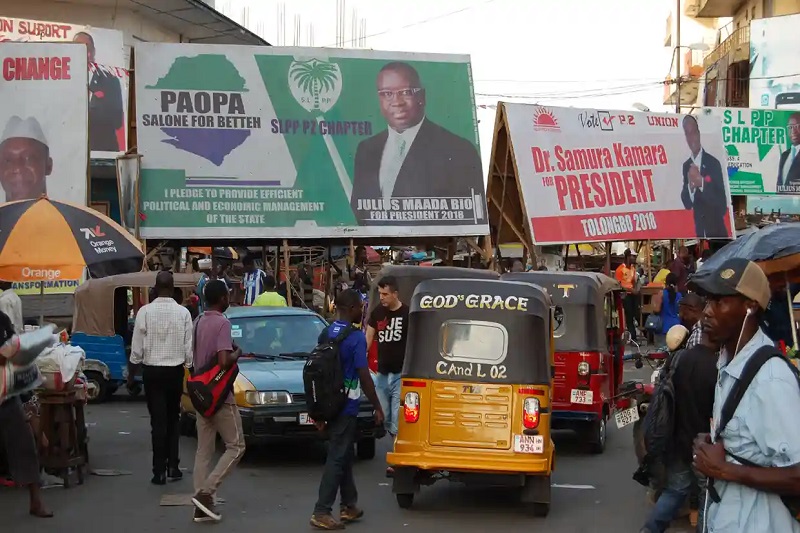On Tuesday, June 20, Sierra Leone’s incumbent president, who is seeking re-election, held his last rally in the nation’s capital, Freetown’s Lumley Beach. A demonstration for Julius Maada Bio was the last one to take place in the nation’s capital before voting began on Saturday, June 24. Additionally, voters will choose the members of the parliament and municipal councils.
There are currently 13 people running for the top post, and Julius Maada Bio is one of them. At the conclusion of a contentious campaign, the candidate for the Sierra Leone People’s Party (SLPP) made a plea for a peaceful election. “I’d like to make a plea to everyone because we want elections to be peaceful. No violence. You have your card; on that day, go and cast your vote,” he addressed one of his supporters while standing on a stage on Lumley Beach in Freetown.
This year, traditional political street gatherings that take the form of parades have been prohibited in order to reduce the risk of violence. A former election commissioner named Macksood Gibril Sesay voiced his concern that there “wasn’t a process of healing” following the violent riots that occurred in August of the previous year. “It’s common knowledge that election season is a time of year when all that’s needed to start the mayhem is a small spark,” said one person. “Everyone knows that.”
When it came time to publish their election platforms, the two major parties waited until exactly one month before the vote. Since then, the opposition has been very critical of the Electoral Commission of Sierra Leone (ECSL), accusing it of having a bias in favour of the ruling party. This has led to rumours that the opposition is preparing the groundwork for a legal challenge, which is a strategy that both parties have utilised in the past. Both sides are disseminating a lot of false information, and this election cycle, the internet may have a bigger impact on voters than ever before.
Related Posts
According to statements made by Information Minister Mohamed Rahman Swaray to AFP, the number of people with internet access has increased to about 3 million, up from 370,000 in 2018. During his first term as president of Sierra Leone, Julius Bio, now 59 years old and a former leader of a coup who served as head of state for three months in the 1990s, championed education and women’s rights while he was at the helm of the dominant Sierra Leone People’s Party (SLPP).
During an interview with AFP, he stated that the reduction of food imports and the prioritisation of agriculture would be his next priorities. Kamara, who is 72 years old and was a former finance and foreign minister but lost to Bio in a runoff election in 2018, told AFP that he would bring in foreign direct investment and restore confidence in the country’s economic institutions.
His supporters feel that the case against him is politically motivated, and he is currently facing charges of embezzling public funds while he was serving as foreign minister. However, despite the fact that he has focused his campaign on economic issues, many experts feel that Bio is not likely to suffer a defeat as a direct result of the severe financial circumstances.
The supporters of Bio who attended the event at Lumley Beach were enthusiastic despite the fact that they were dressed in the colours of the ruling party: ”Electricity is something that is important to us, so it stands to reason that he (Bio) is working on acquiring it. Right? It is being done by him. We want better water. Student Crispin Harding stated, “Of course he is engaging in that behaviour.”
“There are areas that do not have light, and they do not have electricity; however, now that he is a leader, we are having those things, and now we are having those opportunities.” Memunatu Morovia also provided an explanation as to why she would support Bio, saying, “Education is important, and improving the resources is also important.” Because of all that Maada Bio has accomplished for the people of Sierra Leone, he has my undying admiration.
The majority of people in Sierra Leone vote based on their deep-rooted attachment to a particular region, and there is a widespread belief that the regions whose politicians are in power will get an influx of jobs and other benefits. According to the results of a poll conducted on June 14 by the IGR, which is a partner of the pan-African pollster Afrobarometer, Bio is expected to receive 56 percent of the vote, while Kamara will receive 43 percent.
It is predicted that the SLPP will win between 56 and 61 percent of seats in the upcoming parliamentary election, with the APC taking the remaining seats. Critics of Bio contend that the amount of available civic space has decreased under his leadership. The United States-based democracy advocacy organisation Freedom House’s annual index gave Sierra Leone a score of 63 percent this year, down from 66 percent in 2018.
According to Mohamed Kenewui Konneh, the chief electoral commissioner, the opposition is placing a greater emphasis on criticising the body rather than campaigning directly to voters. He told AFP that “at the end of the day, people will be confused” and will not vote, and he urged the opposition to instead help educate voters on the new proportional representation system rather than attempting to confuse them.
On the day of the election, June 24, polling places will open at 7:00 a.m. and remain open until 5:00 p.m. After a decision was made at the last minute to switch from a first-past-the-post system to a proportional representation system, Sierra Leone will go to the polls under the new system.

